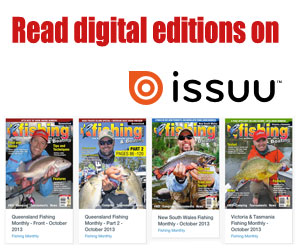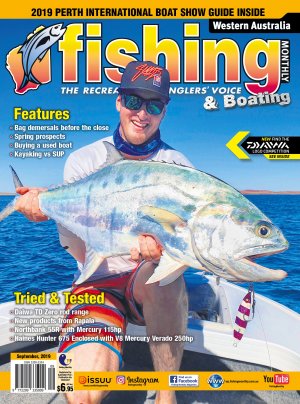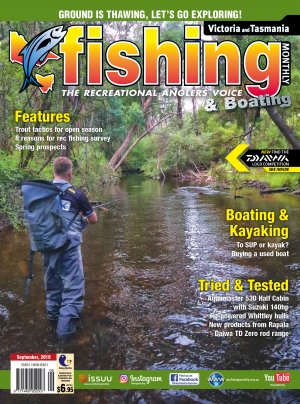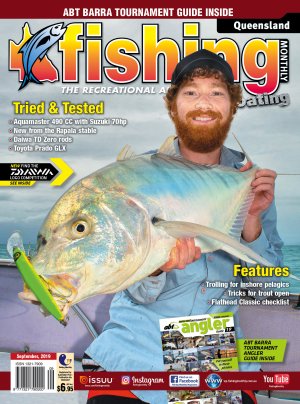The Canberra-Monaro region is now smack in the middle of Winter and for most people that means limited fishing opportunities and shorter fishing days.
Many anglers simply hang up their gear when Winter comes, preferring the comforts of home to the rigours of the outdoor world and good luck to them; at times it is very tempting.
Others take advantage of some interesting and different fishing opportunities and enjoy filling out their angling year.
Many local anglers are keen bass and estuary perch chasers, enjoying the pleasures of tramping, canoeing or boating the coastal streams for one of the hardest-striking fish in the region.
These fish spend most of their Summer in the upper freshwater sections of the rivers but move down to brackish and saltwater areas to breed. Breeding normally takes place around August and after that the fish steadily return to upstream areas.
Bass go a lot farther up than estuary perch and in fact some estuary perch stay in or near saltwater for most of the year.
The trick to finding bass is to find the junction of fresh and saltwater. Sometimes that’s an obvious location, such as the Shallow Crossing ford on the Clyde River, where you mostly have freshwater on the upper side and salt on the lower.
In Summer you fish upstream, in Winter you work your way downstream. You work the snags in the normal way in both areas but expect slower fishing in Winter.
You may find also that bait, such as live prawns, is more effective than lure fishing in Winter, the reverse of the Summer situation.
We also have an all-year fishery in Brogo Reservoir. This small impoundment on the Brogo River near Bega has become a mecca for regional bass fishers.
It is stocked every year with funds raised by the Far South Coast Bass Stocking Association, based in Bermagui, and has a grand population of fish.
Many of these fish are small because a large proportion of adult fish disappear over the wall every time there is a flood, but they are good fun on fly or lure and every now and then you crack it for a big one that didn't fancy the long drop over the wall.
Make sure, though that when you fish you observe the closed season and bag limit. It is illegal to possess a bass or estuary perch from June 1 to August 31.
The fish are stocked on the assumption that most people will fish catch and release and that ensures that there is no undue loss of stock. And of course you can enjoy the delights of the Brogo River downstream, which for obvious reasons carries one hell of a lot of bass.
Then you have all of the lakes we refer to as ‘lowland’, as distinct from the Snowy Mountains. Within reasonable striking distance we have Googong, Burrinjuck, Blowering, Wyangala and Burrendong and the five urban lakes in Canberra.
All are stocked with Murray cod and golden perch and some have catfish and silver perch. All have redfin and carp (except Googong, which is still carp-free).
Pejar Reservoir, near Goulburn, is stocked with brown and rainbow trout and is still free of redfin and carp.
These lakes represent a lot of year-round fishing opportunities but to be successful in Winter you have to know something about the behaviour of each of the fish.
Natives generally slow down dramatically during cold weather. They don't move around much and have less need for food, so you can expect less than normal response to baits and lures.
They can be tempted, however, and one of the benefits of Winter is that commonly you are the only one working a particular spot so your chances of getting a hook-up are enhanced.
Anglers familiar with a particular waterway often know from experience where Murray cod hang out; otherwise you use your brain and look at the landscape. Pinpoint steep rock shelves, prominent jutting boulders, flooded trees, stumps, or other obstructions where fish are likely to lie.
Work on the basis that fish have no eyelids so they will seek shade and shelter for much of the day.
They also like these locations so they can find food such as shrimps, yabbies, mudeyes and small fish and ambush other passing prey. It's commonsense to get lures or baits down deep in those locations to find a fish.
The fish may need more than the normal stimulus to take a lure or bait.
Cod are notorious for this but sometimes you can win by simply pestering the fish into striking. I've seen many cod resist the first few passes with a lure then finally become irritated enough to have a whack and get hooked.
On one memorable occasion I was fishing with a mate on the Murrumbidgee River in Winter and he was convinced there would be a cod against a particular rock. He stood in one location and cast repeatedly to the spot without result, until on the 32nd cast the big cod came out and engulfed the lure – a telling lesson in understanding fish behaviour. And patience.
Golden perch often act in the same manner and sometimes can be tempted by repeated casting to their hidey hole but generally are more active than cod at all times of the day. I've had some splendid sessions on fish in Burrinjuck and Blowering on days when because of the weather all commonsense says you should stay home.
A colleague has a theory about that. He fishes Googong a lot and has noticed that cod and golden perch often lie low for much of the day, then emerge to feed actively for an hour or so.
He says this active period often coincides with a brief burst of sunshine or stronger sunshine and he is keeping a tally of the two events. I will keep you posted about the results.
Most anglers have a love-hate relationship with redfin and carp.
Some see them as pests and strong environmental threats to other fish and other animals. Others just accept the fact that they are there and have fun catching them.
The carp are pretty hopeless to eat but redfin make a superb meal and are worth catching just to help keep the family budget at a proper level.
Both species slow down in Winter but are still catchable. In fact many anglers travel to Blowering during Winter specifically to catch redfin.
They mostly are in boats and hunt around until they find a patch of fish down deep, then work them with ice jigs. On a good day a party can catch several hundred fish and most are put to good use on the table as smoked or grilled fillets. Delicious.
The streams are closed from the Queen's Birthday weekend to the October long weekend but the lakes stay open all year. They provide splendid fishing opportunities, if you know the right techniques.
Fishing from the shore with PowerBait, scrub worms and bardi grubs usually accounts for plenty of rainbows and some browns and deep trolling in the thermoclines can produce larger browns and rainbows.
Fly fishers often fare best with sinking lines and large flies worked close to the bottom. The weather can be tough on some days but on others it can be Jindabyne and Eucumbene at their best.
And the best part is that often you have the place to yourself.
Reads: 1055



